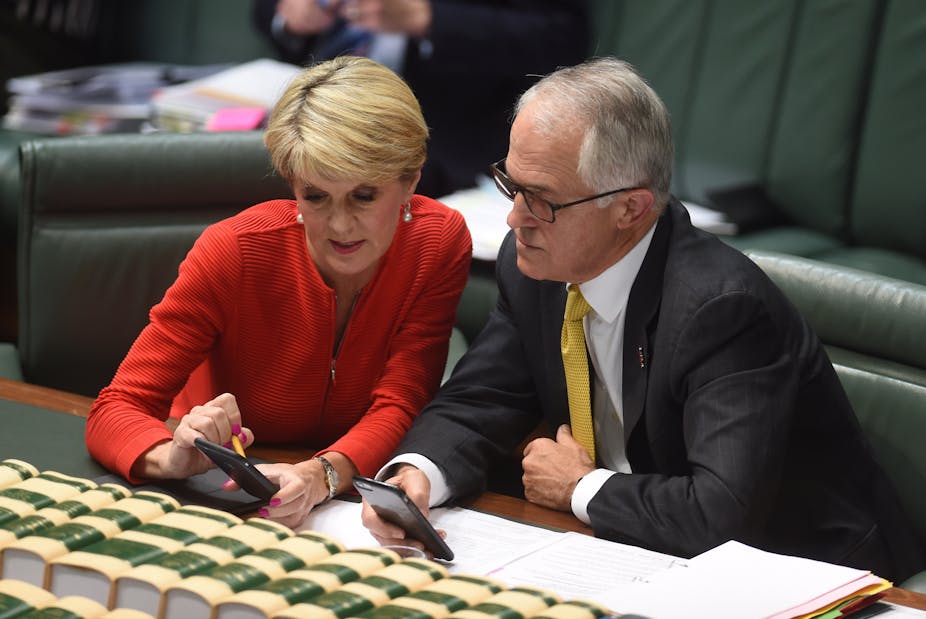The Turnbull government wants to engage with Donald Trump’s administration quickly and constructively, to talk about the United States’ strategic interests and role in the Asia Pacific region.
After the shock presidential election result, Malcolm Turnbull sought to reassure Australians there would continue to be a “strong and intimate” engagement with the US, based in the deep mutual interests of the two countries.
“We will have a strong and effective relationship with [the Trump] administration just as we have with President Obama’s and many administrations before that,” he said.
He acknowledged this as “a historic moment” and admitted Australians had watched the campaign at times with consternation. But he emphasised the difference between electioneering and governing, and rejected any prospect of a Trump presidency leading to a diminution of the alliance with Australia.
“Let me reassure all Australians that the ties that bind Australia and the United States are profound, they are strong, they are based on our enduring national interests,” he said.
“It’s in our mutual interests to stand together and we’ll continue to do so through the Trump presidency and the presidencies that follow it.”
The unfolding election count galvanised politicians in Canberra, with Turnbull and Foreign Minister Julie Bishop studying the US electoral map during Question Time.
In comments after Trump’s victory speech Turnbull said that it was notable that despite the campaign’s bitterness the first thing the President-elect had done after his win was to seek “to bring Americans together. He’s paid tribute to Secretary Clinton. He sought to set out how he will govern for all Americans, whether they voted for him or not.”
Bishop, speaking when Trump’s win was likely but not declared, said it would be incumbent on the government, Turnbull, herself and the Defence Minister “to engage with the new administration very early, very quickly and in a most constructive way, to talk about the strategic interest that the United States has in the Asia Pacific”.
She said countries in the region had been looking for more, not less, US leadership in the region.
Turnbull said it would be interesting to see whether the Congress could achieve the ratification of the Trans-Pacific Partnership, which would benefit Australian business, in the “lame duck” period of the final days of the Obama administration.
Asked about the lessons from citizens staging disruptions of political systems in western democracies, including Brexit, the Trump win and Hansonism, Turnbull said it was very important to ensure in this time of unprecedented change that “sectors and communities are not left behind”.
It was also necessary that “when we defend our free trade and open markets we make it very clear why it is in Australia’s interests in our country to do so. We have to make the strongest case we can for open markets and free trade.”
Pauline Hanson celebrated the Trump win with champagne. “I’m so excited that Donald Trump looks like he’s just over the line and I’m so happy about it because this is putting out a clear message to everyone around the world that the people power is now happening. And it’s happened in Australia with our election – Senator Roberts, myself and two other One Nation senators,” Hanson said.
Conservative Liberal senator and former minister Eric Abetz said the result showed commentators and left-wing activists were out of touch with everyday people.
“President-elect Trump tapped into a widespread disaffection with the self-appointed politically correct elites. There are many lessons to be learned from both Brexit and the US election on which the media and commentariat might like to reflect,” Abetz said.
Bill Shorten said he didn’t apologise for his comments on Trump, which have included calling him barking mad.
But Shorten said Australia’s alliance with the United States was “far bigger than any individual, far more powerful than any personality – and it will endure”.
Shadow Foreign Minister Penny Wong said American engagement “has been a key factor in security in this region, stability in this region, which has been a platform for the economic growth we have seen over many years.
"So one of the things we would continue to assert, and that I believe would be on a bipartisan basis … is the encouragement for the US to stay engaged in this region. We think that is in Australia’s interest. We think that is in America’s interest and it’s in the world’s interest.”

